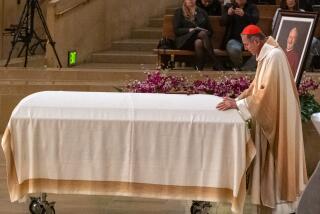Theater rampage: Holmes’ lawyers object to Colorado insanity law
- Share via
CENTENNIAL, Colo. – Defense attorneys for accused movie theater gunman James E. Holmes renewed their objections Monday to the constitutionality of the state’s insanity defense, giving another hint about how they hope to save their client’s life.
Holmes is accused of opening fire in a packed Aurora theater on July 20, killing 12 people and wounding 70 others. He is charged with 166 counts of first-degree murder, attempted murder and weapons charges.
Dist. Atty. George Brauchler announced April 1 that his office would seek the death penalty.
But Homes cannot be put to death if he is found not guilty by reason of insanity or mental defect.
For months, the defense has seemed to be moving toward an insanity plea but has not entered it. Holmes’ lawyers said Monday that their client “suffers from a serious mental illness.”
On March 12, Chief District Judge William Sylvester entered a traditional not guilty plea on Holmes’ behalf when the defense said it was not ready to enter a plea.
Defense attorneys have previously argued unsuccessfully that by entering an insanity plea and forcing Holmes to undergo state-ordered psychiatric evaluations, his constitutional rights could be jeopardized. The defense said if Holmes was forced to cooperate during the evaluation, what he said could be used against him in violation of his right against self-incrimination.
Yet if he did not cooperate, that too could be used against him at trial or sentencing and could prevent his attorneys from introducing expert testimony about Holmes’ mental state, the defense said.
Sylvester discarded those arguments at the time, saying Colorado laws on insanity defense had already been upheld. But because the prosecution had not yet announced that it was seeking the death penalty, the judge left the door open to revisit the issue in the context of a capital case. Since then, Sylvester has stepped aside from the case and been replaced by District Judge Carlos Samour Jr.
On Monday, the defense said the time to take up the constitutional issues had arrived, especially because their client’s life hangs in the balance.
Samour, like Sylvester before him, issued a series of conditions that must be met before he is satisfied that Holmes fully understands the ramifications of an insanity plea.
The defense countered in Monday’s filing that such a guarantee may prove elusive.
“Mr. Holmes suffers from a serious mental illness,” defense attorneys wrote, adding that it might be difficult to know whether he fully understands what is happening because his mental illness may prevent a “plausible grounding in reality.”
Earlier this month, prosecutors filed their own documents, bolstering the case for execution. They cited five aggravating circumstances in the crime, including the “cruel or depraved” nature of the mass shooting, the killing of more than two people, and the killing of a child.
Much of the evidence listed in the prosecution’s filing has already been revealed in previous documents and hearings, but there was a surprise: Tape recordings of Holmes’ interaction with others while being held in Arapahoe County Jail.
The existence of such recordings had not previously been made public. Holmes has been held in isolation since the shooting. In November, he was taken to the hospital twice for self-inflicted injuries.
Earlier this year, the district attorney rejected a defense offer for Holmes to plead guilty with no possibility of parole if the prosecution did not pursue the death penalty.
Samour set a trial date for February. The next pretrial hearing is scheduled for May 13.
In a related development, a federal judge decided that victim lawsuits against the Aurora theater parent company can go forward, but in a narrower scope. U.S. District Judge R. Brooke Jackson ruled April 17 that Cinemark USA is potentially liable for damages under a Colorado law that holds landowners responsible for activities on their property.
But the judge agreed with Cinemark that the company could not be found negligent by not better protecting patrons against the mass shooting.
“I suspect that many people, despite overwhelming sympathy and grief for the victims of the Aurora theater shootings, might upon hearing about these lawsuits have had reactions like, ‘How could a theater be expected to prevent something like this?’ ” Jackson wrote. “I confess that I am one of those people.”
So far about 10 victims have sued the theater for unspecified damages.
nation@latimes.com
ALSO:
Mayor of West, Texas: The face of a ravaged town
Suspect in ricin-letter case held without bail in Mississippi
Student shoots himself in Roman Catholic school in Cincinnati
More to Read
Sign up for Essential California
The most important California stories and recommendations in your inbox every morning.
You may occasionally receive promotional content from the Los Angeles Times.










